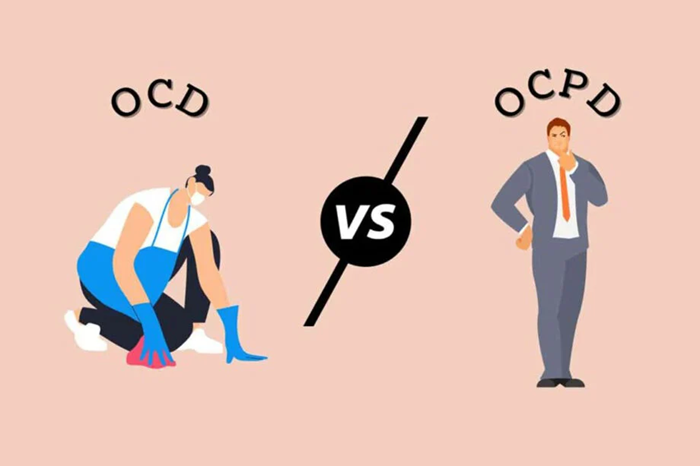Obsessive-compulsive disorder (OCD) and obsessive-compulsive personality disorder (OCPD) are two mental health disorders that are often confused with each other. While both disorders involve obsessive and compulsive behaviors, they are distinct conditions with different symptoms, causes, and treatments. In this article, we will discuss the difference between OCD and OCPD, and how each disorder plays a unique role in mental health.
OCD:Obsessive-compulsive
disorder (OCD) is a mental health disorder characterized by recurring, intrusive thoughts or obsessions, and repetitive behaviors or compulsions. People with OCD often feel driven to perform these compulsive behaviors in order to alleviate the anxiety caused by their obsessions. OCD can significantly impact a person’s daily life, causing distress and interfering with their ability to function.
Symptoms of OCD
The symptoms of OCD can vary from person to person, but often include:
- Obsessive thoughts or fears, such as fear of contamination, fear of harm to oneself or others, or fear of making a mistake
- Compulsive behaviors, such as excessive cleaning, checking, or counting
- Repetitive rituals, such as touching objects in a certain order or repeating phrases
- Avoidance of situations that trigger obsessions or compulsions
- Significant distress or impairment in daily life
Causes of OCD
The exact causes of OCD are not fully understood, but research suggests that a combination of genetic, environmental, and neurological factors may play a role. OCD may also be linked to imbalances in certain brain chemicals, such as serotonin.
Treatment of OCD: Treatment for OCD typically involves a combination of medication and psychotherapy. Selective serotonin reuptake inhibitors (SSRIs) are often used to reduce symptoms of anxiety and depression associated with OCD. Cognitive-behavioral therapy (CBT) is also an effective treatment for OCD, and may involve exposure and response prevention (ERP) therapy, which involves gradually exposing the person to their fears or triggers and helping them learn to resist performing compulsive behaviors.
OCPD: Obsessive-compulsive
personality disorder (OCPD) is a mental health disorder characterized by a preoccupation with orderliness, perfectionism, and control. People with OCPD may have rigid beliefs and expectations, and may struggle to adapt to change or uncertainty. OCPD can significantly impact a person’s daily life, causing distress and interfering with their ability to function.
Symptoms of OCPD
The symptoms of OCPD can vary from person to person, but often include:
- Preoccupation with rules, orderliness, and perfectionism
- Inflexible beliefs and expectations
- Difficulty delegating tasks or working with others
- Excessive devotion to work or productivity
- Rigidity and stubbornness
- Lack of spontaneity or ability to relax
- Significant distress or impairment in daily life
Causes of OCPD
The exact causes of OCPD are not fully understood, but research suggests that a combination of genetic, environmental, and neurological factors may play a role. OCPD may also be linked to imbalances in certain brain chemicals, such as serotonin.
Treatment of OCPD: Treatment for OCPD typically involves psychotherapy, such as cognitive-behavioral therapy (CBT). CBT can help people with OCPD learn to challenge their rigid beliefs and expectations, and develop more flexible ways of thinking and behaving. Group therapy may also be helpful for people with OCPD, as it can provide support and validation while also teaching skills for managing symptoms.
The Role of OCD and OCPD in Mental Health: While OCD and OCPD are distinct disorders, they both play important roles in mental health. OCD can cause significant distress and interfere with a person’s daily life, but effective treatments are available to help manage symptoms. OCPD, on the other hand, can cause problems in interpersonal relationships and work settings, but with the right treatment, people with OCPD can learn to manage their symptoms and live fulfilling lives. It is important to seek help if you or a loved one is experiencing symptoms of OCD or OCPD, as effective treatments are available.
Related topics:
- Your Guide To Postpartum OCD: How Long Until It Clears Up
- Top 5 Vitamins For Ocd Treatment
- Is Obsession A Sign Of Mental Illness?


